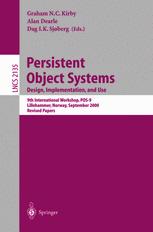

Most ebook files are in PDF format, so you can easily read them using various software such as Foxit Reader or directly on the Google Chrome browser.
Some ebook files are released by publishers in other formats such as .awz, .mobi, .epub, .fb2, etc. You may need to install specific software to read these formats on mobile/PC, such as Calibre.
Please read the tutorial at this link: https://ebookbell.com/faq
We offer FREE conversion to the popular formats you request; however, this may take some time. Therefore, right after payment, please email us, and we will try to provide the service as quickly as possible.
For some exceptional file formats or broken links (if any), please refrain from opening any disputes. Instead, email us first, and we will try to assist within a maximum of 6 hours.
EbookBell Team

4.3
48 reviewsThe Ninth International Workshop on Persistent Object Systems (POS 9) took place at the SAS Radisson Hotel in Lillehammer, Norway, from 6th to 8th September 2000. Previous workshops in the series have been held in Scotland (1 and 2), Australia (3), the USA (4), Italy (5), France (6), and the USA (7 and 8). In keeping with those workshops, POS 9 was short but intensive, fitting 28 papers and panel sessions, a boat 1 excursion, and some memorable meals into two and a half days. The participants’ concentration was no doubt helped by the Northern European weather that prevailed for most of the workshop. Continuing a trend experienced over the previous few workshops, POS 9 had difficulty attracting a high number of papers. Of course it is hard to tell whether this is a problem with the field of persistent systems itself, or merely a consequence of the increasing number of workshops, conferences, and journals competing for submissions. In his Epilogue to the proceedings, Ron Morrison makes some interesting suggestions for possible improvements to future POS workshops. Out of a total of 26 submitted papers, 19 were accepted for presentation at the 2 workshop. Breaking down by region, 6 1/2 came from the USA , 1 from Africa, 3 1/2 from Australia, and 8 from Europe. In a new development for POS, an equal number of papers came from England and from Scotland.